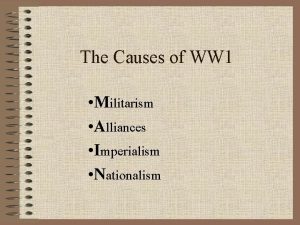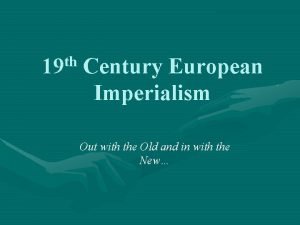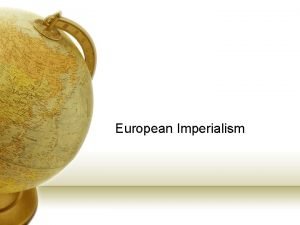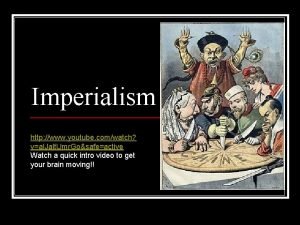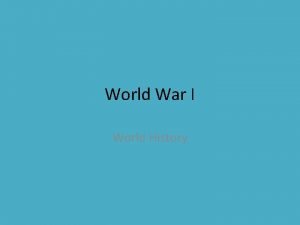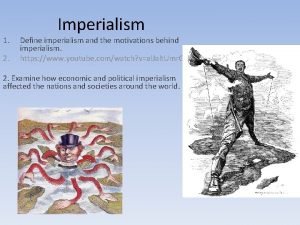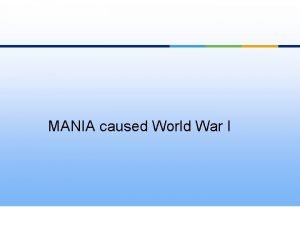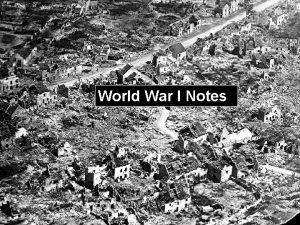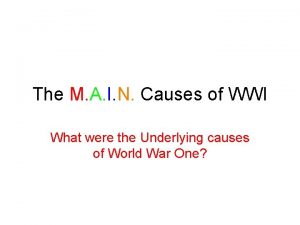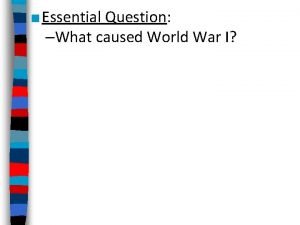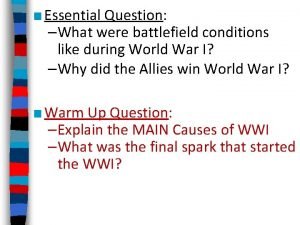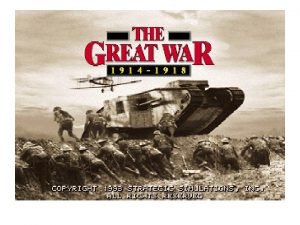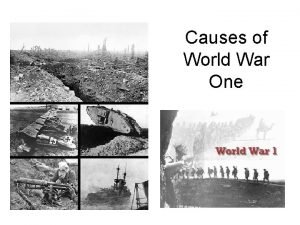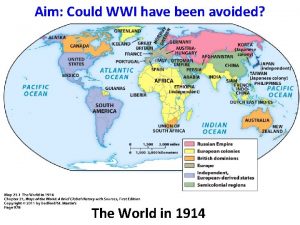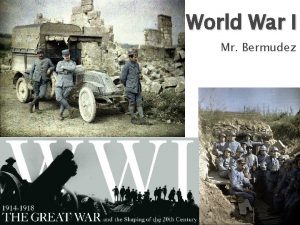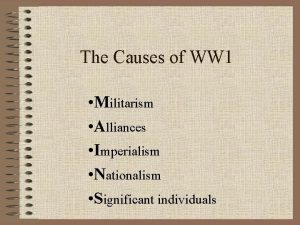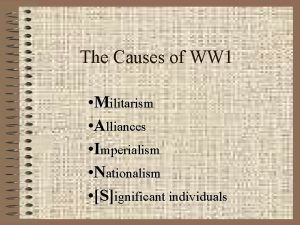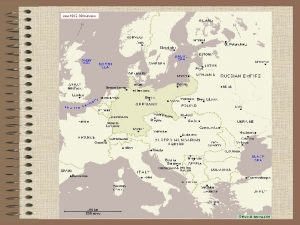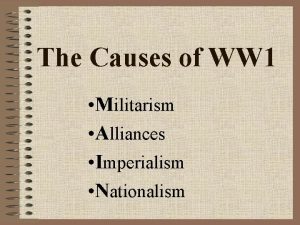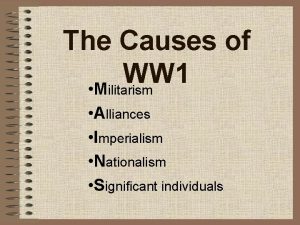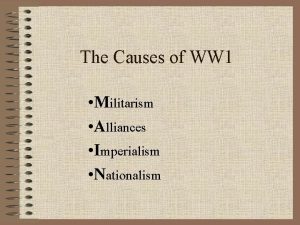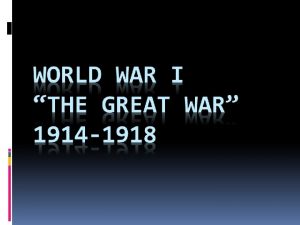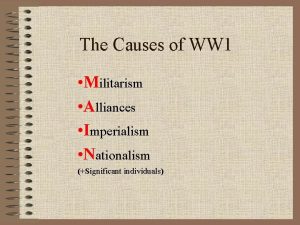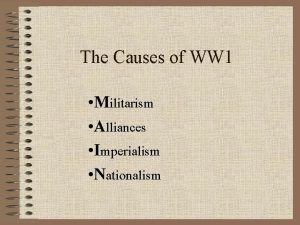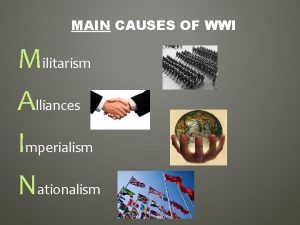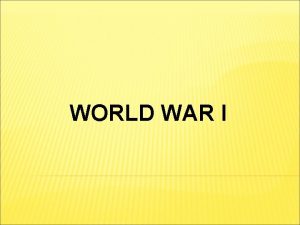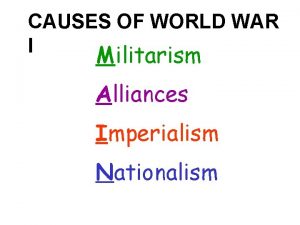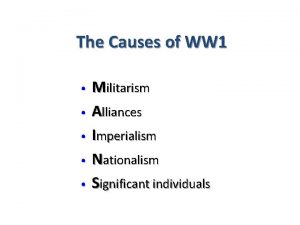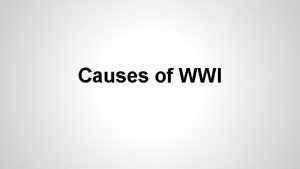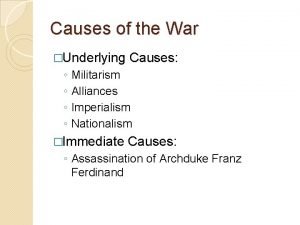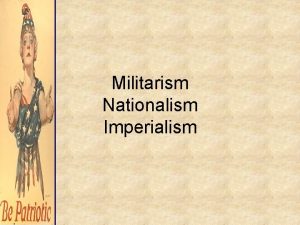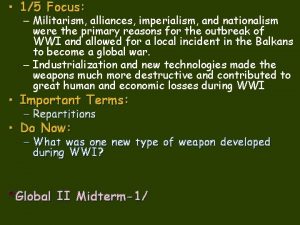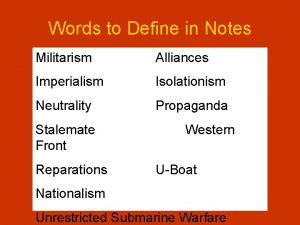The Causes of WW 1 Militarism Alliances Imperialism


























- Slides: 26

The Causes of WW 1 • Militarism • Alliances • Imperialism • Nationalism • Significant individuals

“M” stand s for MILITARISM • Conscripting soldiers, longer training periods, modern weaponry to gain military superiority

Militarism 1. • Germany was competing with the UK to build battleships. • The British feared an attack on their Empire

Militarism 2. • Germany was competing with Russia and France to expand their armies 1880 1914 • Germany 1. 3 m 5. 0 m • France 0. 73 m 4. 0 m • Russia 0. 40 m 1. 2 m

“A” stands for ALLIANCES w Guaranteed support of all if one is attacked

Alliances • By 1914 all the major powers were linked by a system of alliances. • The alliances made it more likely that a war would start. • Once started, the alliances made it more likely to spread.

Pre-WWI Alliances

The Problem With Alliances

“I” stands for IMPERIALISM • a policy of extending a country's power and influence through diplomacy or military force.

Imperialism • All the great powers were competing for colonies / territory. • The British feared Germany in Africa. • The Austrians feared Serbia / Russia in the Balkans

Balkan Land Russia and Austro-Hungary rivals in the Balkans

Importance of Africa • Britain and Germany competed for Markets and imperial control in Africa and Asia See Colony Slideshow

“N” stands for NATIONALISM • patriotic feeling, principles, or efforts • This was an age when all nations wanted to assert their power and independence.

Serbia vs. Austria-Hungary • In Europe Slavs, aided by Serbia and Russia, wanted to be free of Austrian rule. • Serbia wanted Austro-Hungarian territory inhabited by Slavs • Subject peoples- Slavs, Czechs, Slovaks, and Poles- wanted independence

France vs Germany • France wants the French-inhabited provinces of Alsace-Lorraine, lost in the Franco-Prussian War of 1870, back

“S” stands for Significant Individuals.

Significant Individuals 1. • Kaiser Wilhelm II • Built up German army and navy • Aggressive foreign policy • Determined to make Germany a top nation. • Distrusted by other powers “Germany must have its place in the sun” “The world belongs to the strong. ”

Significant Individuals 2 • Count Berchtold • Austrian Prime Minister. • During the July Crisis, decided on a very tough ultimatum for Serbia “Were the Serbs to agree to all the demands, this would not be to my liking”

Significant Individuals 3 • Bethmann Hollweg • German Prime Minister • Gave very strong support to Austria during the July crisis while Kaiser was cruising on his yacht “The Austrian demands are moderate. Any interference by Britain, France and Russia would be followed by incalculable consequences”

The Crisis 1. • 28 June 1914 • Heir to Austrian throne Franz Ferdinand visits Sarajevo. • Capital of Bosnia, recently grabbed by Austria. • Hotbed of Slav nationalism Seal of the Black Hand group

The Crisis 2. • “Black Hand” terrorists attack the Arch Duke • Bomb attempt fails in morning • Gavrilo Princip shoots Archduke and wife in the afternoon. • Austrians blame Serbia for supporting terrorists.

The Crisis 3. • Austrians, supported by Germany, send Serbia a tough ultimatum (see “The Ultimatum” hand-out) • Russia mobilises her troops to support Serbia • Germany demands that Russia stands her armies down. • Germany declares war on Russia “Demands must be put to Serbia that would be wholly impossible for them to accept …”

…and this has World Map to do with Canada

Why did Britain get involved? • Britain had Ententes with France and Russia. • Only “friendly agreements” but French and Russians given impression Britain would fight. Sir Edward Grey British Foreign Secretary … “There’s some devilry going on in Berlin”

The Schlieffen Plan • Germany’s military plan to defeat France and Russia. • “Knock out blow” aimed at France first. • Avoid French defences by invasion of Belgium. • Germans thought Britain would not intervene.

Britain’s Reaction • 1838 - UK had signed a Treaty to protect Belgium. • Britain also scared of Germany controlling Channel ports. • Did not want Germany to defeat France and dominate Europe. Britain next? • UK issued ultimatum to Germany to withdraw troops from Belgium. War declared August 4 1914
 Imperialism nationalism militarism alliances
Imperialism nationalism militarism alliances Nationalism imperialism militarism
Nationalism imperialism militarism Causes of new imperialism
Causes of new imperialism Old imperialism technology
Old imperialism technology What were the causes of imperialism
What were the causes of imperialism Imperialism
Imperialism Causes of imperialism
Causes of imperialism Natural resources imperialism
Natural resources imperialism Causes of imperialism
Causes of imperialism Causes of new imperialism
Causes of new imperialism Cause of colonialism
Cause of colonialism Define queen
Define queen Militarism
Militarism Imperialism
Imperialism Militarism world history definition
Militarism world history definition What caused ww2
What caused ww2 Serbs in albania
Serbs in albania Mania in world war 1
Mania in world war 1 Causes of ww1 mania
Causes of ww1 mania What are the underlying causes of ww1
What are the underlying causes of ww1 Nationalism in europe
Nationalism in europe Militarism
Militarism Militarism definition
Militarism definition Militarism
Militarism Militarism definition
Militarism definition Militarism
Militarism What was ww1 about
What was ww1 about
